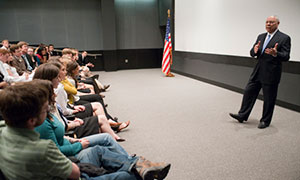Ret. Gen. Colin Powell — former U.S. secretary of state and one-time leader of 350,000 troops — knows how to make an entrance.
“Sit down, you’re making me nervous,” barked the general in the good-natured tone perfected over five decades of Army leadership, politics, and diplomacy.
Having stared down world leaders and stood up to the four American presidents he served, Powell could hardly have been intimidated by the 50 students who rose in unison as he entered Golden Auditorium Friday.
Prior to Powell’s public lecture in Sanford Field House, the students participated in a 30-minute question-and-answer session. They were chosen because of their interests in political science, international relations, and peace and conflict studies.
Among them were 18 first-year Benton Scholars, whose coursework has focused on global leadership. Fred Chernoff, Harvey Picker Professor of international relations and director of ş¬Đ߲ÝŃĐľżËů’s international relations program, moderated the discussion.

Prior to his public lecture, Colin Powell speaks with 50 students in Golden Auditorium. (Photo by Andy Daddio)
Chernoff called on students whose prepared questions addressed issues spanning the globe: whether combining military and development forces in Afghanistan will jeopardize the development community there, how seriously to take North Korea’s nuclear threat, and whether success in Iraq means Jeffersonian democracy.
“The Iraqis want us to leave,” Powell said, “but not until they can do the job [of governing] themselves.” He cautioned that every nation’s government must suit its culture and people.
“Some will remain totalitarian and cruel,” he said, “but most are modulating their policies. We’ve been a little too cavalier about lecturing other countries that our form of democracy is the best kind.”
Then Powell, eager for spontaneity, barked again: “Now — who doesn’t have a written note?”
“What is your greatest failure?” asked Connor Tucker ’10.

Colin Powell’s public lecture about leadership drew 4,500 faculty, staff, students, and members of the community to Sanford Field House.
After total recall and certainty on every other subject, Powell admitted to a bit of a hedge. “I have a lot of failures and a lot of successes,” he said.
“Rather than try to single one out, I just accept it all as a total body of experience. When I have a failure I go into a funk, think about it, analyze it, and then roll it up in a ball and throw it over my shoulder.
“So to answer that question I’d have to think about it and I don’t like to do that.”





















